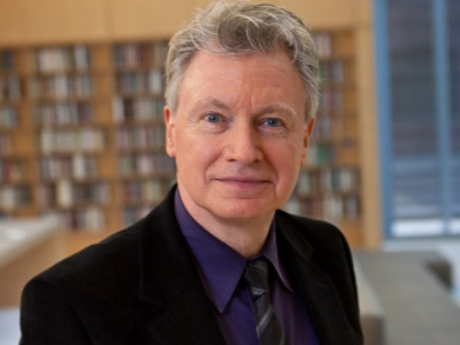In Their Own Words
Robert Polito’s “Hollywood & God”

Hollywood & God
If only God would save me,
I would know how to hurt you.
If only God would save me,
I would know who to sell my soul to.
Anything is an autobiography,
but this is a conversation –
William Burroughs insisted
literature lagged 50 years behind painting,
thinking no doubt about abstraction, collage,
fragmentation, his cut-ups.
But whatever that meant (why always 50 years?), or however
he presumed to rile other writers,
poetry probably does lag behind any credible media theory about it –
so that if I put a pine tree
into a poem,
a grove of pine trees
and beyond them the sea,
you'd think it was the same tree Wordsworth put there;
instead of two obligatory centuries of nature studies, all those
Technicolor vistas, torch songs, couples
drifting through leaves in Salem commercials.
Into one life and out another,
the way a junkie playing a writer,
a writer playing a priest,
so that when I finally blurted out,
You-betrayed me/I-wounded-you/We're-so-unhappy
you assumed the burden of personal urgency,
supposed it was me speaking at the limits of my self-control
and not The Damned Don't Cry,
Temptation, and Leave Her to Heaven
You open your mouth and a tradition dribbles out.
But that's mimesis –
how almost impossible to avoid mimesis,
anybody's hardest truths prompting the most fractured constructions,
the way to think about God might be
to disobey God,
if only God's wish to remain hidden,
so that if everything is an autobiography,
this is a conversion.
As my lives flash before me,
why must the yearning for God
trump all other yearnings?
You often hear converts confess
the drinking, his pills, her sexual addiction,
concealed inside them a yearning for God –
why not the other way around?
The admission of Jesus into your life
concealing instead the wish, say, a need
to be fucked senseless drunk drugged & screaming
OH GOD! OH GOD! on a hotel bed…
God embraces our yearnings.
That afternoon my father heard his diagnosis of inoperable cancer,
my aunt Barbara demanded we get him to Lourdes.
She demanded this with a glass of vodka in her hand –
she demanded this running her fingers up and down my leg –
she demanded this before she passed out in her car –
In the movie of my life,
my father died
after I forgave him,
& when my secret tormentor said may the ghosts of your dreams
gnaw at your belly like a wolf under your jacket,
did she really want revenge,
or was she just killing time?
For me God is a hair shirt, or he's nothing;
for me God is a pain in the ass;
that's mimesis, again,
this hour I tell you things in confidence,
I might not tell everybody, but I'll tell you.
The world is a road under the wall to the church,
the world is a church, & the world is a road,
& the world is a stone wall.
Still, he wanted her the way the Cardinal wanted the Caravaggio,
& when the ill-advised possessor of the painting resisted –
one night Papal Guards searched his house.
Of course contraband came to light, some illegal rifles,
& when the ill-advised possessor of the painting went to prison –the Cardinal got his Caravaggio.
But I wasn't a Cardinal, nephew to the Pope,
and you –
you were not a Caravaggio.
So I asked you to be in my movie.
"Hollywood & God" by Robert Polito from Hollywood & God (University of Chicago, 2009). Reprinted with the permission of the author.
On "Hollywood & God"
"Hollywood & God" is the title poem of my recent collection of poems, a book that combines poetry and prose, and coming late in the sequence distills and reflects back on the issues of the entire proceeding. From the outset, I viewed the alliance in the title as the intersection of two streets – Hollywood & Vine, Hollywood & Gower, and Hollywood & God. The book, as well as this poem particularly, tracks a continuum along what traditionally you might style transcendence and what we've today come to call celebrity culture.
All through Hollywood & God I was interested in telling other people's stories in what looks like my voice and my own stories in what looks like other people's voices. Autobiography mixes with fiction, and even essay, in the sense of probing a subject. So although much of this poem advances in the first person that insistent "I" isn't necessarily anyone I know well. There's a strong personal aspect here – my father's death, and that encounter with my Aunt Barbara about Lourdes went exactly that way, and I discovered the concluding Caravaggio episode while touring the Villa Borghese on a trip with my wife in Rome. But this is also collage – Stein, Whitman, and Pessoa, among others. Identity is a persistent focus here – self-invention, mimicry, and disappearing.
Ever sense I wrote a biography of crime novelist Jim Thompson I've stayed fascinated with noir, and for me at least there are echoes of noir in "Hollywood & God." But I first arrived at noir, whether Thompson, David Goodis, or Patricia Highsmith, through Samuel Beckett: those beautiful sentences saying the most awful things.


